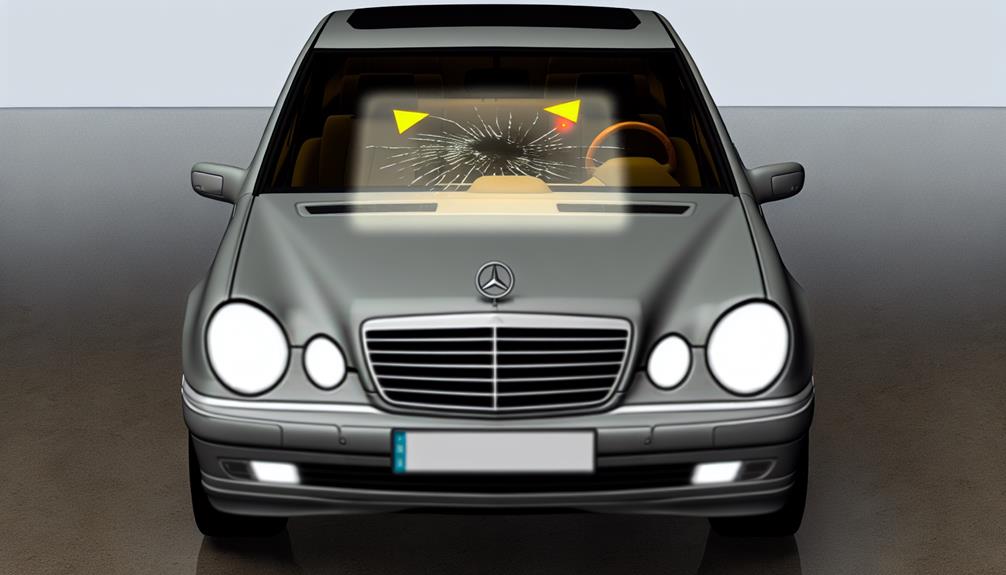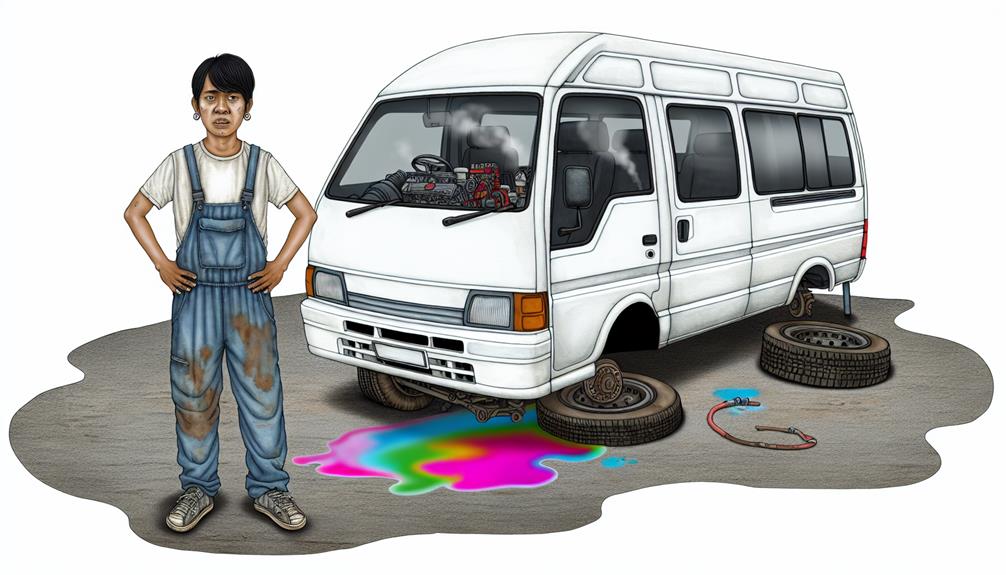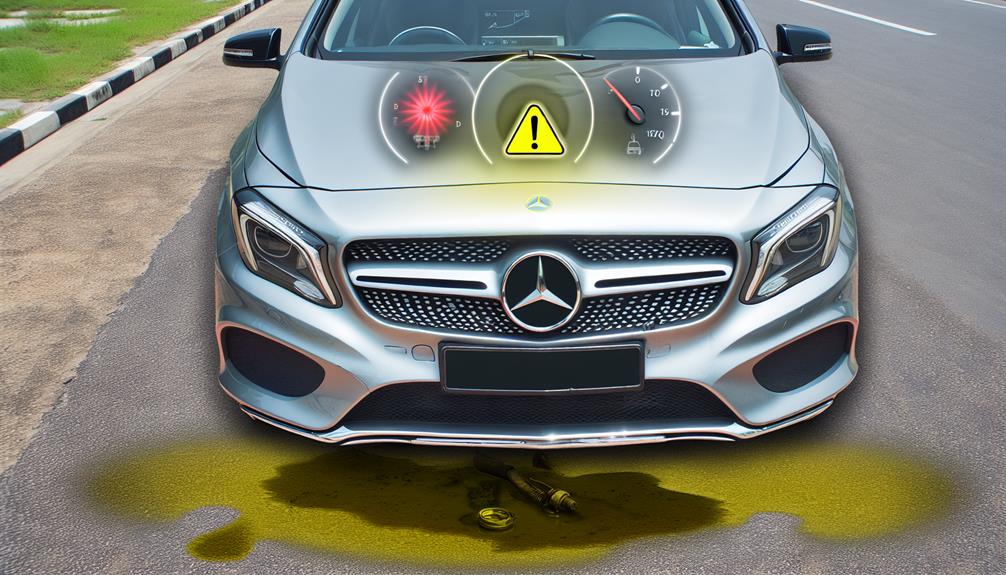If you own a Mercedes E320, watch out for radiator issues that can lead to coolant contamination and transmission damage. Keep an eye on coolant levels and seek professional help for radiator problems. SBC Sensonic Brake Control malfunctions may cause unexpected brake problems, so regular checks are vital to guarantee driving safety. Upgrading the Analog-Only Teleaid system can enhance emergency features and connectivity. Remember to schedule regular transmission maintenance to prevent rough shifting and potential damage.
Additionally, the 2005 W211 model has a reputation for reliability but may face common issues such as squeaky brakes and electrical problems. Keeping up with maintenance and inspections can provide a smooth driving experience. Discover more about the E320's common problems and improvements for a well-informed approach to maintaining your car.
Key Takeaways
- Monitor coolant levels to prevent radiator issues like coolant contamination.
- Regular maintenance checks for SBC system malfunctions to ensure brake safety.
- Upgrade Analog-Only Teleaid for modern emergency features and connectivity.
- Schedule transmission fluid changes to prevent rough shifting and damage.
- Address known issues in the 2005 W211 model for a reliable driving experience.
Radiator Failure and Coolant Contamination
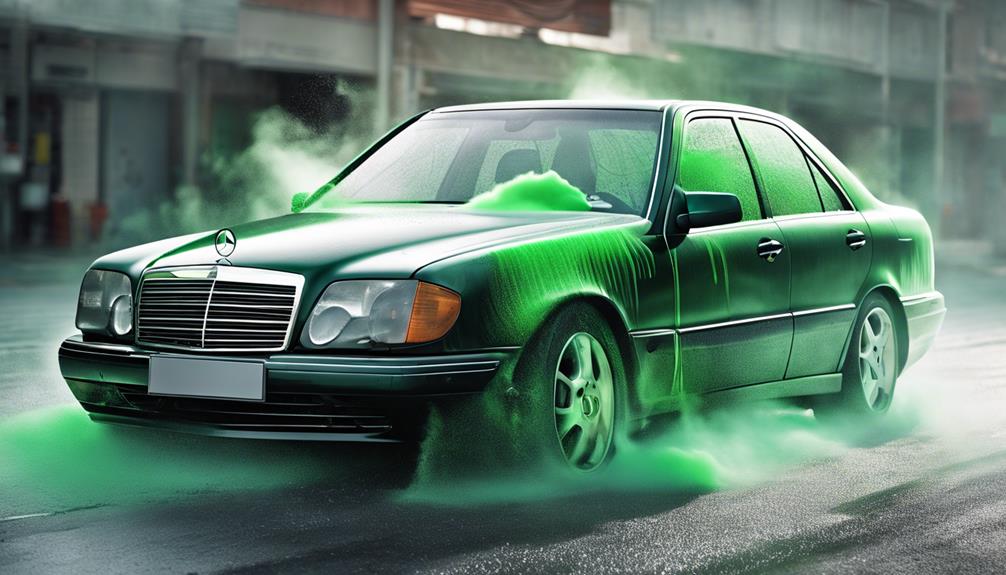
If you own a 2003 Mercedes E320, being attentive about radiator health is crucial to prevent coolant contamination and transmission damage.
Radiator failure in this model can result in coolant mixing with transmission fluid, which poses a serious risk to the transmission system. Coolant contamination of the transmission fluid can lead to significant damage, potentially resulting in costly repairs and transmission failure.
To avoid these issues, it's essential to address any radiator problems promptly. Regularly monitoring coolant levels and ensuring proper radiator function can help prevent coolant contamination from occurring.
If you suspect any radiator or coolant-related issues in your Mercedes E320, it's advisable to seek professional inspection and repair services to mitigate the risk of transmission damage.
SBC Sensonic Brake Control Issues
SBC Sensonic Brake Control issues in 2003 Mercedes-Benz E320 models can potentially lead to brake system malfunctions and safety concerns. The common issues with the SBC Sensonic Brake Control system are vital to address promptly to guarantee the safety of your vehicle and passengers. Here are some key points to ponder:
- SBC problems may result in unexpected brake activation or failure, compromising the vehicle's ability to stop effectively.
- Brake system malfunctions due to SBC Sensonic Brake Control issues can pose significant safety risks, especially during sudden braking situations or emergencies.
- Repairs for SBC malfunctions can be both costly and complex, requiring specialized knowledge and equipment to rectify the issues effectively.
To prevent these potentially hazardous situations, regular maintenance checks are essential. Keeping a close eye on the SBC system can help detect any early signs of malfunction and address them before they escalate into more severe problems. Your vigilance in monitoring the SBC Sensonic Brake Control system can contribute to a safer driving experience in your Mercedes E320.
Analog-Only Teleaid/MBRACE System
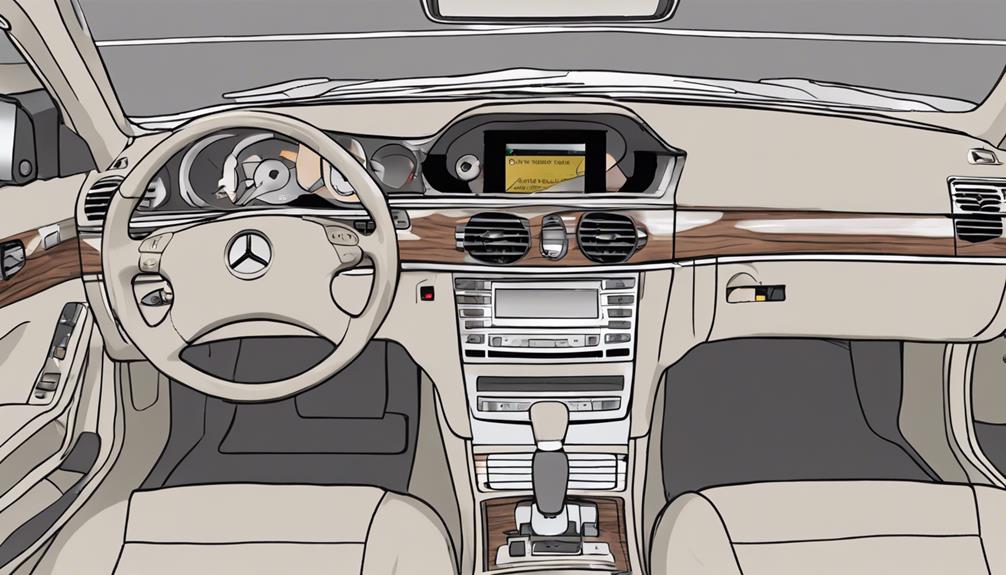
If you own a 2003 Mercedes-Benz E320, you might encounter issues with its analog-only Teleaid/MBRACE system. This outdated technology could limit your access to modern emergency assistance features.
Consider retrofitting modern telematics systems to enhance your vehicle's safety and connectivity capabilities.
Outdated Technology Concerns
Amidst the advancements in automotive technology, the analog-only Teleaid/MBRACE system in 2003 Mercedes-Benz E320 models poses challenges for owners seeking modern connectivity features.
As an E320 owner, you may encounter the following concerns with this outdated technology:
- Limited emergency assistance capabilities compared to newer digital systems.
- Restrictions on accessing advanced telematics features available in more recent vehicles.
- Difficulty in enjoying the safety, convenience, and connectivity features offered by newer Mercedes-Benz models.
Retrofitting digital telematics systems could be a viable solution if you're looking to update your older E320 vehicle to enjoy enhanced modern features.
Limited Emergency Assistance
The analog-only Teleaid/MBRACE system in 2003 Mercedes-Benz E320 models presents limitations in emergency assistance capabilities compared to modern digital systems. This analog-only setup may not offer the same level of advanced features and connectivity that newer digital systems provide.
Due to its analog nature, the Teleaid system could encounter compatibility challenges with contemporary cellular networks, potentially affecting its reliability in emergency situations. Upgrading to a digital emergency assistance system could notably enhance the safety and connectivity features in your vehicle, ensuring you have access to more robust emergency services when needed.
To explore options for improving your emergency assistance capabilities, consider reaching out to a Mercedes-Benz dealership or service center for guidance on upgrading the analog system.
Retrofitting Modern Features
Retrofitting modern features to enhance the analog-only Teleaid/MBRACE system in older Mercedes E320 models can significantly improve the vehicle's functionality and safety features. By integrating aftermarket solutions and retrofit kits, you can smoothly shift from analog to digital technology, enabling benefits such as Bluetooth connectivity and advanced navigation systems.
This upgrade not only enhances safety features and communication abilities but also boosts overall convenience while driving. Additionally, embracing contemporary digital technology can potentially increase the resale value of your Mercedes E320 and offer a more enjoyable driving experience.
With these solutions, you can enjoy the advantages of updated communication and entertainment options without the need to invest in a new vehicle.
Transmission Fluid and Filter Replacement
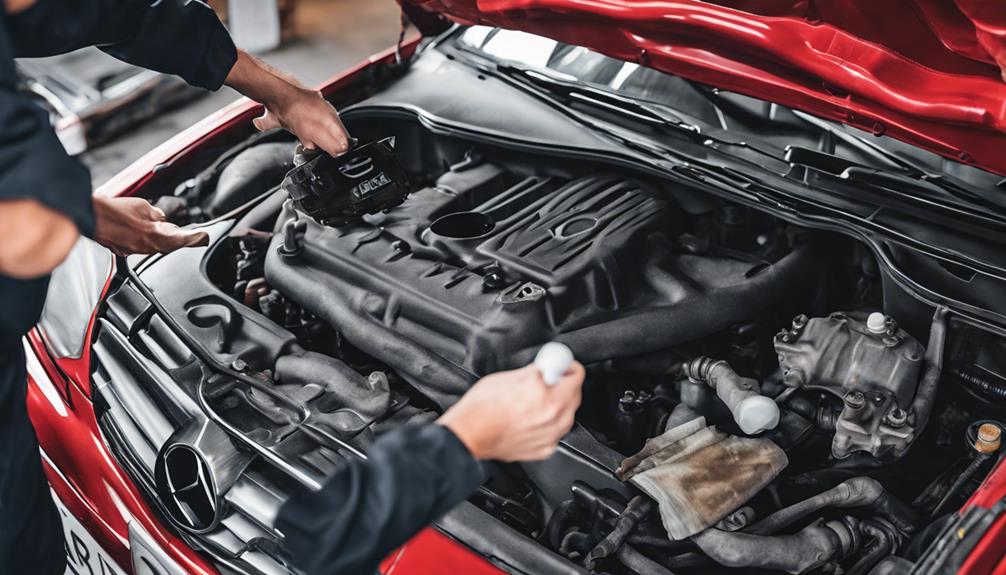
Taking into consideration the recommended service intervals for optimal performance, it is vital to schedule transmission fluid and filter replacement for your Mercedes E320 every 50,000 to 70,000 miles. Neglecting this maintenance task can result in issues such as rough shifting, slipping gears, and potential transmission damage in your E320. Regular transmission fluid changes help prevent overheating, lubricate moving parts, and guarantee the smooth operation of your Mercedes E320's transmission system. Fresh fluid also keeps internal components clean, reduces wear and tear, and extends the lifespan of your transmission.
Below is a table summarizing the key points related to transmission fluid and filter replacement for your Mercedes E320:
| Aspect | Importance | Benefits |
|---|---|---|
| Regular Maintenance | Essential for peak performance | Prevents issues like rough shifting, slipping gears, and potential transmission damage |
| Fluid Quality | Critical for internal component health | Reduces wear and tear, keeps components clean, and prolongs transmission lifespan |
| Manufacturer's Advice | Vital to follow for reliability | Helps avoid costly repairs, maintains reliability, and guarantees smooth operation of the transmission system in your Mercedes E320 |
Reliability of 2005 W211 Model
The 2005 W211 model of the Mercedes E320 stands out for its exceptional reliability within the E-Class range. Owners have consistently reported minimal mechanical issues and commendable durability with this particular year.
Its solid construction, reliable performance, and enduring value make it a sought-after choice among Mercedes enthusiasts.
2005 E320 Known Issues
Common issues that owners of the 2005 W211 Mercedes E320 may encounter include:
- Squeaky Brake Pads: Some owners have reported squeaking noises coming from the brake pads, necessitating replacements sooner than anticipated.
- AC System Malfunctions: Instances of the AC system failing to cool effectively or issues with the climate control system have been noted.
- Electrical Gremlins: A few owners have experienced minor electrical problems such as intermittent dashboard warning lights or malfunctioning window switches.
Despite the overall reliability of the 2005 W211 E320 model, these specific issues have been observed by some owners. Regular maintenance and timely inspections can help address these concerns and guarantee a smooth driving experience.
Common Repairs Needed
If you've owned a 2005 W211 Mercedes E320, you may have noticed that maintenance tasks are typically straightforward for this model.
When it comes to common repairs needed, the brake system on the 2005 W211 E320 may require attention over time. Regular inspections and timely replacement of brake pads and rotors can help maintain peak braking performance.
Additionally, the air suspension in this model can sometimes face issues, necessitating repairs to guarantee a smooth and comfortable ride.
Another essential component to keep in check is the cabin air filter, which should be replaced periodically to uphold good air quality inside the vehicle.
Improvements in 2007 E350 Models

In 2007, Mercedes E350 models saw significant enhancements in engine performance and fuel efficiency compared to their predecessors. The improvements in the 2007 E350 models include:
- Enhanced Engine Performance: The 2007 E350 models are equipped with more powerful and efficient engines, providing a smoother and more responsive driving experience.
- Advanced Safety Features: Safety is prioritized in the 2007 E350 models with the integration of advanced airbag systems and stability control, enhancing overall protection for you and your passengers.
- Updated Technology: The 2007 E350 models come with state-of-the-art technology, such as improved navigation systems and entertainment options, keeping you connected and entertained while on the road.
These enhancements make the 2007 E350 models a significant upgrade over the previous E320 models, offering improved performance, safety, and technology for a more enjoyable driving experience.
Maintenance Recommendations and Diagnostic Tools
For peak performance and longevity of your Mercedes E320, prioritizing regular maintenance checks and utilizing diagnostic tools is essential. When it comes to maintenance, changing the transmission fluid every second oil change is critical for the E320 CDI. Additionally, checking components like the intake manifold gasket, ball joints, and rear differential can help prevent potential issues. Ensuring the proper functioning of systems like the Brake Control and AIRMATIC system is also crucial for the overall health of your vehicle. When in doubt, consulting the service department or a trusted mechanic can provide valuable insights into your car's maintenance needs. Below is a table highlighting some key maintenance recommendations and diagnostic tools for your Mercedes E320:
| Maintenance Recommendations | Diagnostic Tools | Service Department |
|---|---|---|
| Change transmission fluid regularly | OBD-II Scanner | Dealership maintenance recommended |
| Check intake manifold gasket | Digital Multimeter | Independent mechanic for pre-purchase inspection |
| Inspect Brake Control system | Pressure Gauge | Regular servicing for optimal performance |
Frequently Asked Questions
Are Mercedes E320 Reliable?
Yes, Mercedes E320 cars are generally reliable. They offer a blend of luxury and performance. Routine maintenance is key to their longevity. Regular servicing and addressing issues promptly can help you enjoy a smooth driving experience.
What Are the Common Faults in Mercedes E320 Cdi?
You might face fuel injector seal leaks, SBC braking system issues, keyless go malfunctions, ball joint replacements, and transmission conductor plate problems in your Mercedes E320 CDI. These faults can affect performance and safety, requiring attention.
Is Mercedes E320 Discontinued?
Yes, the Mercedes E320 was discontinued after the 2009 model year. It was part of the E-Class lineup, known for luxury and performance. Despite its discontinuation, newer E-Class models with updated features are available.
What Years Did Mercedes Make the E320?
Mercedes-Benz produced the E320 model from 1993 to 2009, offering it in various body styles like sedan, wagon, and coupe. Throughout its run, the E320 maintained a reputation for luxury, performance, and style.
Conclusion
To sum up, owning a Mercedes E320 comes with its fair share of common problems, but with proper maintenance and awareness, these issues can be managed effectively.
Remember to stay on top of radiator health, address any SBC brake control issues promptly, consider upgrading from analog Teleaid/MBRACE systems, and guarantee regular transmission fluid and filter replacements.
By staying informed and proactive, you can enjoy the luxury and performance of your E320 for years to come.





